One of my earliest memories is reading, or more probably—holding a book and pretending to read. And I remember being so jealous when my brother, who’s three years older, went to school. I couldn’t wait to get to that mysterious, exciting place where he got the textbooks he brought home in his satchel (another item I envied). But when I arrived at Clark Hill Elementary in Olive Hill, Kentucky, to my great disappointment, first graders didn’t do a lot of reading—that treat was reserved for second graders. But since it was a small school where first and second grade shared a room, I got to listen as Miss Alice Sue Dehart taught reading to the older grade, and at recess she let me flip through the giant red storybook that sat on an easel and featured adventures of Jimmy and Sue and their dog Pepper.
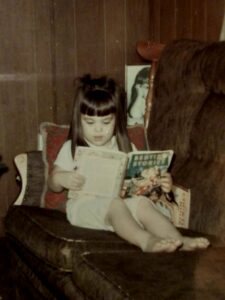
Me at age 3 curled up with a book titled Bedtime Stories.
I loved words and reading came easy to me. I exhausted the closet-sized elementary school library that was underfunded and understocked but contained a handful of books from incomplete series like Nancy Drew and Hardy Boys, with some classics like Heidi and A Tree Grows in Brooklyn. My small hometown didn’t have a public library at the time, but at home I scoured our set of Encyclopedia Britannica and read Progressive Farmer magazine cover to cover. (This is where I should mention I grew up on a working farm—cattle, tobacco, and a huge garden. If Progressive Farmer is a nostalgic reference for you, you might enjoy this vintage book of wisdom from the magazine titled Cornerstones, printed in 1990.)
My dear mother subsidized my early reading with bookclubs—every month or so an envelope of two hardcover books would arrive and I’d read them in like, an hour. But I remember them being obscure and literary—even then I gravitated to genre books! A couple of times a month, I spent my allowance at Ben Franklin’s Five & Dime on Nancy Drew and Trixie Belden mysteries, determined to accumulate my own library on the bookshelf my father made (and I still have). Over the years my immediate and extended family contributed to my 52-book set of Nancy Drew books on birthdays and holidays, a collection I cherished and maintained for over 40 years before passing them along to young cousins.
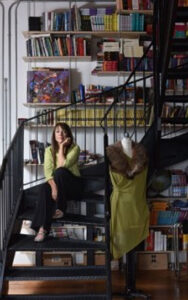
Me circa 2014 sitting on the stairs in my Atlanta loft with my prized set of yellow Nancy Drew books on the shelf behind me.
In fourth grade my teacher Miss June Ross made each of us stand up and say what we wanted to be when we grew up. I bounced out of my desk because that was easy—I was going to be a librarian, of course, so I could be surrounded by books! (I’m sure the other kids groaned and considered me an annoying four-eyed goody-two-shoes.)
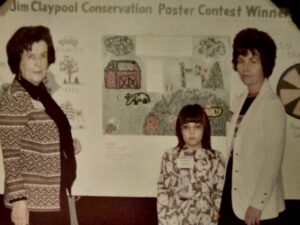
Me, age 9, between my teacher Miss June Ross and my mother Bonnie Bond.
That same year Miss Ross gave me an autographed book titled Old Ben by famed Kentucky author Jesse Stuart. It was a revelation—real people wrote books? I wrote to Mr. Stuart to tell him I enjoyed the story, and he sent me back a postcard, both of which I still have. I especially cherish that Miss Ross wrote her name in the book. She was an influential teacher who escorted me to local and tri-state spelling bees and told me stories about her life. She was single and wore silver-colored loafers, and I thought she was utterly glamorous.
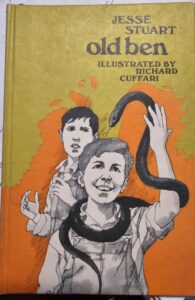
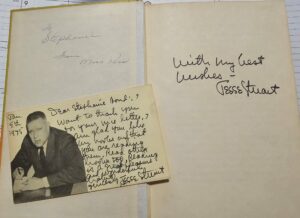
The cover of Old Ben, inside inscription from my teacher Miss Ross, autograph and postcard from legendary Kentucky author and poet Jesse Stuart (1906-1984) dated January 5th, 1975. The postcard reads “Dear Stephanie Bond, I want to thank you for your nice letter. I am glad you like my books and that you are reading them. Read other books too. Reading is a great pleasure and wonderful habit. Sincerely, Jesse Stuart.”
Once I asked about a scar on Miss Ross’s leg. She told me when she was young, she’d been in a terrible car accident. She said it wasn’t her only scar and she’d been in a coma for some time after the accident, then added she could remember everything that happened when she was in the coma. That story stuck with me, but I’ll tell you more about that later.
Somewhere around fifth grade, my aunt Fonda, who lived in Ohio and was an avid reader, began to bring me huge bags of paperbacks—gothic novels by Phyllis Whitney and Victoria Holt and Harlequin Romances (the sweet ones). I thought I’d died and gone to heaven and since entertainment on the farm was slim pickings—we had two TV channels and shared a multi-family party-line phone—I tore through the paperbacks at the rate of one a day. And my voracious reading habits continued into high school.
My sophomore year, English teacher Miss Nancy Mackenzie decided to deviate from our textbook lessons. She read to the class the beginning of a story, then challenged us to write our own ending. It was as if she had set my brain on fire. I wrote my ending and handed it in. The next day she picked three papers to read aloud and to my amazement, one of them was mine. For two weeks she repeated the writing exercise, and it became my goal to be one of the top three “endings” she read aloud. Yet as much as I loved the assignments, it never occurred to me that I could be a fiction writer.
By the time I graduated high school, I had forsaken my nine-year-old dream of becoming a librarian to focus on business and math classes. When I enrolled in Morehead State University in 1983, I threw myself into learning computer programming, which was then a fairly new field of study. In the wake of my intensive schoolwork, my fiction reading fell by the wayside.
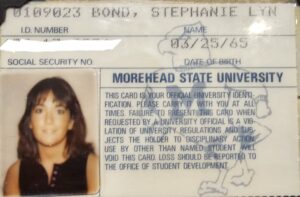
My student ID from Morehead State University where I studied the then relatively new field of computer programming. At the time the school’s main computer didn’t have its own compiler so MSU “borrowed” another university’s compiler from midnight to 6 a.m., which meant we programming students couldn’t begin our homework until the witching hour!
While attending college I worked part-time at a shoe store that was marginally successful. The owner began to spend more and more time away from the business, so I took on more responsibility—it was like small-business bootcamp. When the owner decided to sell, I bought the business, changed the name to Boots & Britches, and for two years, specialized in selling boots and Levi’s jeans in between my full load of classes.
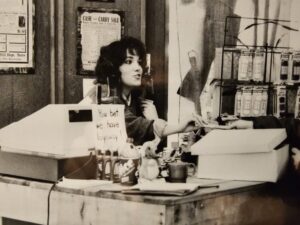
Me at my retail business Boots & Britches, circa 1985. It was a great business education and would later inform my decision to launch a self-publishing business.
Upon graduating college, I sold my retail store and went to work for Ashland Oil (now Marathon) as a systems engineer in Lexington, Kentucky. I loved my job supporting the company's stockholder records system, but the hours were long, and I was still too busy to read for fun. (In hindsight I realize reading is a habit that’s easy to fall out of because it feels so indulgent and excludes others.) Fast-forward a couple of years—I was now married and decided to pursue an MBA at night. Getting my master’s degree took me five years, but it turned out to be a life-changing event.
I was taking the capstone course of the program and one of the requirements was to write a comprehensive paper on a business project we’d chosen. I’m not positive, but I believe mine was on integrating a cafeteria-style benefits program, which was a new concept at the time although not exactly a riveting topic! Anyway, when the professor returned my paper, he made the comment that he thought I could get the paper published. I remember being confused and repeating, “Published?” He looked at me quizzically and said hadn’t anyone ever told me I had a flair for writing? I said no. He went on to say he thought I should submit the paper to business journals, but I remember utterly zoning out. It was as if all the “happy” moments in my school and work career came rushing at me. I'd always been the person electrified at the prospect of writing papers, book reports, business plans, progress reports... and I recalled vividly the writing assignments back in sophomore English class—it all made sense now.
And the thought slipped into my mind, I wonder if I could write a romance novel?
My professor would’ve been scandalized if I’d told him what I was thinking, so I kept my mouth shut. But the seed was planted. The following week, my night classes were over, and I finally had some free time on my hands. I pulled my long-neglected collection of romance paperbacks from dusty boxes and reacquainted myself with the thrill of reading for pure pleasure. I didn’t know if I could create a story that would transport others the way stories had transported me, but I felt compelled to try.
So I booted up my IBM 387 desktop computer, opened a blank file in WordPerfect, and began to type. ~